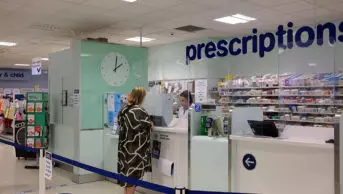The Pharmacists’ Defence Association and many of the candidates who have put their names forward in the Royal Pharmaceutical Society’s national pharmacy board elections are concerned that one pharmacist may soon be permitted to assume responsible pharmacist status for more than one pharmacy premises — so-called “remote supervision”.
It is, seemingly, not widely recognised that remote supervision has already been enabled by the Medicines (Pharmacies) (Responsible Pharmacist) Regulations 2008, albeit perhaps only during the allowable two-hour period of absence of the responsible pharmacist. This should be obvious to anyone who understands the origin and purpose of standard operating procedures (SOPs).
An SOP is a document that describes what is being done, by whom and how. The SOPs that matter to responsible pharmacists are those that relate to the delivery of a safe and effective dispensary service as prescribed by the Regulations. Importantly, the Regulations have promoted the status of dispensary SOPs from professional to legal. So, it is now illegal for dispensary staff not to comply with their SOPs. They are, in effect, byelaws. They are an extension to the employment contracts of employed dispensary staff and to the contracts of service of self-employed locum pharmacists.
The origin of SOPs can be traced back to the mid 1970s when the requirements of good laboratory practice were put in place by the US Food and Drug Administration following its acquisition of new powers to re- quire more robust safety and efficacy testing of pharmaceuticals after the thalidomide tragedy. They provide documentation with which lawyers can work if there is a need to prosecute an offence through the courts, and they name the individuals who are responsible (ie, traceability and accountability). Their purpose is to enable courts to apportion blame. Typically, SOPs evolve from informal to formal good practice guidelines, and then to legally enforced standards. This is a fact of life.
In the pharmaceutical industry, SOPs are essential to the product licensing process. SOP deficiencies identified during an inspection by a relevant authority can result in the immediate shut-down of a manufacturing facility and the suspension of a product licence, leading to a “manufacturer cannot supply” situation and, typically, the summary dismissal of the accountable person. Community pharmacies are already subject to audit by their local primary care trust or health board. We can look forward to much more rigorous audits and inspections in the future.
It should be evident that what is happening in community pharmacy is in effect the implementation of “good pharmacy practice” (GPP). The history of our GPP SOPs is traceable to the 1995 Bristol babies scandal. This led in the NHS to the imposition of “clinical governance” — a systematic approach to maintaining and improving the quality of care. In due course, the Health Act 1999 imposed a statutory “duty of quality” on all NHS service providers. By 1 January 1995, the Society had already made it a requirement that written protocols be followed by medicines counter staff when selling over-the-counter products or giving advice — an early example of an SOP. It was not until 2002 that the implementation of dispensary SOPs in community pharmacies started as an informal good practice guideline. On 1 January 2005, dispensary SOPs became a professional requirement. On 1 October 2009, when the responsible pharmacist Regulations came into force, dispensary SOPs became a legal requirement. This was entirely predictable to any student of the history of SOPs.
So, how do our dispensary SOPs already enable remote supervision?
The phrase “by or under the supervision of a pharmacist” was not precisely defined in the Medicines Act 1968 but its meaning has over time been defined by case law. In amending the Medicines Act 1968 through the Health Act 2006, legislators have explicitly sought to defer making a change to the law relating to supervision. However, the responsible pharmacist Regulations themselves appear to effect a change in the law on this matter.
The Regulations list a range of activities that “must be covered by pharmacy procedures” then state that one of the matters that “must” be covered is the “identification of members of pharmacy staff who are, in the view of the responsible pharmacist, competent to perform certain tasks relating to the pharmacy business”. Further, the pharmacy procedures “must” specify “the arrangements which are to apply during the absence of the responsible pharmacist from the premises”. The courts will in time reach their own conclusions about the meaning of these words, but in terms of a lay person’s interpretation of the English, these words tell us that if a responsible pharmacist believes that named dispensary support staff are competent to perform certain tasks (for example, handing out checked and bagged prescriptions during a period of absence), then as long as their authority to do these tasks is properly documented in dispensary SOPs, that is all that is necessary. After all, when a properly trained medicines counter assistant hands out a checked and bagged prescription in accordance with the relevant dispensary SOP, there should be no need for the pharmacist to be present to oversee the moment of handover. Usually, the handover will take place out of earshot or sight of the pharmacist. Why should it then make any difference whether the pharmacist is in the dispensary, upstairs in the staff room, outside the pharmacy buying a sandwich for lunch, or indeed nowhere near the pharmacy during a two-hour period of allowable absence?
The same logic applies to the delivery of medicines: why do our current Society guidelines allow a responsible pharmacist to hand over a box of checked and bagged medicines to a delivery driver for delivery in his or her absence but not to a trained medicines counter assistant to hand them out in the shop in his or her absence?
Worryingly, I fear that none of the SOPs I have seen in the many dispensaries where I have worked would pass muster if subjected to rigorous cross-examination in a court of law. How many have actually been updated or even reviewed to take into account the responsible pharmacist Regulations? SOPs should be treated as controlled documents. They should bear the version number on each page. Each page should be numbered and initialled and dated by the accountable person.Training records should be part of individual SOPs and the trainer should be identified along with his or her qualification to carry out the training. (It is not enough simply to ask the trainee to read an SOP and sign to say that they have read it.That is not “training”.) As new versions are implemented, training against each new version has to be carried out, and old versions with their individual training records need to be securely archived. That is just an overview I have gained from having worked for a while in an industrial environment where US corporate lawyers control SOP implementation.
We do not need remote supervision, whatever that might mean, over and above what we have already. We first need to learn how to work under SOPs bearing in mind the brave new world of good pharmacy practice into which we are heading. This, I fear, will take years rather than months to achieve so long as the blind are leading the blind.
Richard Schmidt, part-time locum community pharmacist and business consultant
You may also be interested in

RPS calls for authorisation of pharmacy technicians to supervise pharmacies to be documented

Pharmacy technicians may prepare and dispense medicines without supervision under government proposals
